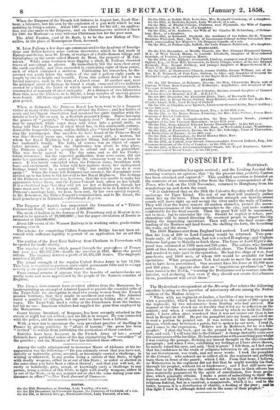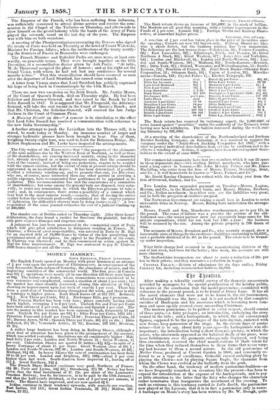POSTSCRIPT.
SATITRDAY.
The Chinese question has again revived ; and the Leading Jourhal this morning ventures an opinion, that "by the present time probably Canton has been attacked and captured." This qualified assertion is founded on the contents of an interesting letter from the China correspondent of the Times, who had, on the 11th November, returned to Hongkong from his wanderings up and down the coast. "It is understood that on the 16th the Calcutta flag-ship will change her anchorage for Tiger Island. The rest of our fleet will gradually gather about her up the river. Then in deliberate strength our heavily-armed vessels will move right up and occupy the river under the walls of Canton. They will clear the water, remove all sunken obstacles, protect the neces- sary reconnoissances of the land-approaches to the city , and make matters comfortable for the final assault. Then the great Telt sill be summoned, not to treat, but to surrender the city. Should he neglect or refuse, pro- clamations will be issued directing the unarmed people to depart the city during the impending operations. Then will conic the final scene—the landing of the Marines and land forces, the shelling the forts, the breathing the walls, and the storm."
The 1000 Marines sent from England had arrived. Lord Elgin trusted that his loan of 500 to Lord Canning would be returned. Two gun- boats only, of all the squadron, had not reached Hongkong ; and Captain Osborne had gone to Manilla to fetch them. The force at Lord Elgin's dis- posal was estimated at 7000 men and 700 guns. The sailors, who furnish 4000 of this force, were undergoing drill on shore. The French Minister had resolved to take part in the operation. He had five ships of war, four gun-boats, and 1000 men, of whom 600 would be available for land operations. What preparations Yeh had made to meet the storm seems not to have been ascertained. One account fixes his force at 22,000 men and 200 guns. It appears also that an "impertinent proclamation" has been issued in the North, "warning the Barbarians not to venture into the interior, and declaring that even if they should not create disturbances there, punishment will await them."
The Hyderabad correspondent of the Morning Post relates the following anecdote bearing on the question of missionary efforts among the Native soldiers of the Madras Army- " When with my regiment at Jaulna, a havildar of my troop came to me with a pamphlet, which had been circulated to the extent of 200 copies in the regiment, by two missionaries from Bombay who had arrived. His manner at the time struck me so forcibly that it led me to reflection on the subject; and when I considered the thread by which we held the Native army, I have often since wondered that it was not sooner cut than it has been in Bengal in 1857. He put the pamphlet into my hand, and asked me to read a portion he pointed out. It was written in the language of the Deccau, which may be termed a patois, but is spoken by our men. I read it, and I crune to the expression, Believe not an Mehemet, for he is a false prophet.' I shut the book, spat on the ground in token of my disapproba- tion, and said, I will take this to the Colonel.' A change instantly came over the countenance of the havildar. He had scanned me w ith a searchin g gaze whilst I was reading the passage, divining my inmost thought on the objectionable paragraph ; and when I rose, exhibiting my feelings as I have above shown, he merely raised his eyes, and said, God is great.' I felt then, as I feel now, that his confidence in the truth of religious toleration to all, as enunciated by our Government, was truth, and not mere words. I took the pamphlet to the Colonel ; who ordered me to collect all in the regiment and publicly burn them in front of the guard ,• which I did. From that hour, I believe, no Mahometan in the regiment did not feel that he might worship his God, through his prophet, without let or hinderance ; aud I feel still more cer- tain, that in the Madras army the confidence of the men in their officers has been materially guaranteed by the spirit of conciliation, free from preju- dice, which generally obtains. I make a point of subscribing to their Me- hurrum and their Fatyahs,—to the former, not in the light of a Mahometan religious festival, but as a carnival, a masquerade, which it is; and to the latter, because it is a distribution of charity, a feeding of the poor; and ha this light I view it, although doled out in the name of their prophet."
The Emperor of the French, who has been suffering from influenza, was sufficiently recovered to attend divine service and receive the com- munion in the Chapel of the Tuileries on Thursday, and afterwards to show himself on the grand balcony while the bands of the Army of Paris played the serenade usual on the last day of the year. The Empress was with him on both occasions.
. A meeting of the Plenipotentiaries representing the Powers who signed the treaty of Paris was held on Thursday at the hotel of Count Walewski, Minister for Foreign Affairs ; when the ratifications of the treaty rectify- ing the frontiers of Russia in Bessarabia were exchanged.
The French Minister and Redschid Pasha are once more, at least out- wardly, on peaceable terms. They were brought together on the 19th December, at a reconciliation dinner given by Aali Pasha. "At table, M. de Thouvenel occupied the place of honour ; and at his right eat the Grand Vizier, with whom ha had not had any conference for several
• months before." That this reconciliation should have occurred so soon after the departure of Lord Stratford, has caused sonic remark. A letter from Vienna states that Lord Stratford has publicly expressed his hope of being back in Constantinople by the 15th March.
There are now two vacancies on the Irish Bench. Mr. Justice Moore, of the Court of Queen's Bench, died on Thursday night. He had been Solicitor and Attorney-General, and was raised to the Bench by Lord John Russell in 1847. It is supposed that Mr. Fitzgerald, the Attorney- General, will take the seat vacant in the Court of Queen's Bench ; and that Mr. Christian the Solicitor-General, will succeed the late Judge Jackson in the Court of Common Pleas.
A Horning Herald on dit-" A rumour is in circulation to the effect that Lord John Russell has received a communication with reference to the new India Secretaryship."
A further attempt to push the Leviathan into the Thames will, it is stated, be made today or Monday. An immense number of larger and stronger hydraulic presses have been brought to bear. One of them, weighing twenty-eight tons, was used to hoist the Britannia Bridge. Mr. Robert Stephenson and Mr. Locke have inspected the arrangements.
The City writer of the Times states that "the prospects of the claimants . of the nine millions due by the Western Bank of Scotland, as well as those of the shareholders, are causing increased anxiety, owing to the shameful :fact, already developed in so many analogous cases, that the commercial laws of the country, instead of being any protection, require to be avoided with the utmost caution, lest the extent of ruin at present certain should be aggravated in an incalculable degree. It has been determined, if possible, to effect a voluntary winding-up, and to promote that end, the Directors, who 'are, of course, more interested than any other parties in averting a public exposure have recommended four gentlemen to be appointed as quidators. This recommendation has met the concurrence of a committee of shareholders ; but some among the general body are disposed, very natu- rally, to resist any nomination in which the Directors presume to take a part ; and, in consequence, there seems a possibility of a contest which ' may lead to the most ruinous result,-namely, that of forcing the entire matter before the tribunals professedly constituted for the express purpose of lightening the difficulties of every man by doing justice to all." A cor- respondent of the same journal estimates the cost of a judicial winding-up at 500,000/.
The slander case at Dublin ended on Thursday night. After three hours' deliberation., the Jury found a verdict for Strevens the plaintiff, but they only gave suloeuee damages and sixpence costs.
A judgment has just been pronounced in the commercial court of Paris which will give great satisfaction to foreigners residing in France. M. Clairvaz, a Swiss of great respectability, was arrested in Paris by M. Bigi for an asserted debt of 16,000 francs by virtue of the law permitting the provisional arrest of foreigners. On appeal to the President of the court, M. Clairvaz was liberated ; and he then commenced an action against 21. lligi for false imprisonment. M. Big-i was sentenced to pay M. Clairvaz 2000 francs damages and all the costs.



































 Previous page
Previous page